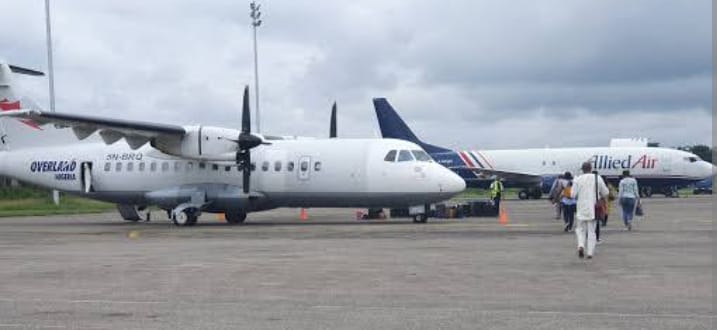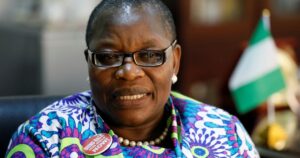By Farooq A. Kperogi
I have been in Nigeria in the last few days for the public presentation of Dis Life No Balance: An Anthology of Diasporan Voices, the book I co-wrote with Professor Moses Ochonu and Dr. Osmund Agbo. I will write on this, all things being equal, next week when I return to Atlanta. Keep a date.
But my experience traveling through Nigerian airports in Lagos and Abuja brought me face to face once again with the tragedy of atrociously incomprehensible accents that air hostesses and airport announcers routinely torture hapless passengers with.
In a 2016 column after a visit to Nigeria, I called attention to passengers’ frustration with the maddeningly fake accents at the Nnamdi Azikiwe International Airport in Abuja that no one understood. Months after the publication of the column, readers wrote to tell me that they had noticed noticeable changes. However, it seems to me that the problem has returned. Even people who make announcements on airplanes have accents that only they understand.
I reproduce below an abridged version of the column in hopes that it may inspire some reforms:
I developed a heightened sensitivity to the frustratingly incompetent affectation of a trans-Atlantic English accent (that is, an awkward hybrid of American and British accents) among Nigerian airport announcers when I traveled to Nigeria in November 2015 at the invitation of the British Council to train journalists.
In fact, to call the accents I heard on airport announcements—and on FM radios—inept affectations of a hybridized Anglo-American accent is to undeservedly humor them. I know most people who travel through Nigerian international airports—and listen to Nigerian FM stations— know what I am talking about. The accents are neither American nor British. Nor are they, for that matter, Nigerian—or anything; they are just abominably inaudible babbles that mindlessly grate on the hearer’s auditory sensibilities with their exaggerated but spectacularly incongruous nasalization of every sound.
Apparently, Nigerian airport announcers and radio DJs have led themselves to believe that all you need do to sound “foreign” and “cosmopolitan” is to speak every English sound through the nose.
I don’t care for the bungling, babbling disc jockeys on our FM stations who speak through their noses like people with bad respiratory infections. I do care, however, about airport announcers because their pronunciational imbecility has far-reaching consequences for both Nigerian and foreign users of our airports. Many people have missed their flights because they couldn’t figure out what the heck the announcers were saying. As you will read shortly, I also almost missed my flight recently because of Nigerian airport announcers.
On all occasions I was at the Nnamdi Azikiwe International Airport in Abuja last year, I found many Westerners, for whose sake airport announcers speak through their noses, asking Nigerian passengers what the airport announcers were saying; they couldn’t make sense of the irritating blare of nasal cacophony that passed for announcements.
But they got no help from Nigerians who thought affected nasalized accents were a competent mimicry of Western accents, which should be comprehensible to Westerners. One Nigerian who was approached for help by a white man encapsulated this sentiment when he said: “Na wa o. See as Oyinbo dey ask me to interpret him language for am. The way the announcers dey speak, no be so una people too dey talk—through una nose?”
I would have rolled on the floor laughing (to use Internet lingo) if I wasn’t insanely incensed at my own inability to make out “Kano” from “Cairo” from the announcer’s voice. Yes, it was that bad: Cairo and Kano sounded exactly alike in the announcer’s nasalized babble.
I would have missed my flight to Kano if I didn’t trust my instincts to go ask a group of resplendently babbar riga-attired gentlemen in a queue if they were going to Kano. Of course, the pilot’s announcement welcoming us to the “plight” to Kano assured me that I was indeed on the right plane and that my plight with the airport announcer with tediously fake and exaggeratedly nasalized accent was over—at least for that day.
I discussed this issue with several people at the airport who told me barely audible, affected airport announcers’ accents are becoming a desperate menace. Someone even jokingly called it “a grave national security threat!”
But this isn’t a joke. I heard stories of Nigerians and foreigners alike who missed their flights because they couldn’t figure out what the announcers were saying. And since passengers can neither see the announcers physically to seek clarification nor have access to even a basic digital airport signage that shows flight itinerary, they are often condemned to the tyranny of the pretentious but incomprehensible accents of illiterate airport announcers.
There is one other important reason why the Nigerian airport announcers’ accents are irksome: they don’t represent the range of accents in Nigeria. There are at least three types of accents in Nigeria.
At the top of the totem pole of Nigerian accents is what I call imported but authentic foreign accents. These are the accents of foreign-born (or foreign-educated) Nigerians in Nigeria (such as the crisp British accents of former House of Representatives speaker Oladimeji Bankole, Minister of Environment Amina Mohammed, human rights activists Ayo Obe and Ayesha Imam; the American accent of former NAPEP coordinator Magnus Kpakol, etc.).
You also have what I call the Nigerian broadcasters’ accent, fully realized in the mellifluous, articulate accents of broadcasters like Cyril Stober, Kalu Otisi, Yusuf Aliyu Addy, Eugenia Abu, Ruth Opia, etc. And then there is what I call demotic Nigerian English accent, which has regional variations.
September 18, 2014, CNN article that identified Nigerian English accent as the world’s 6th “sexiest accent,” obviously prefers demotic Nigerian English accents to the first two because it chose the accents represented by King Sunny Ade and Omotola Jalade Ekeinde as its examples of “famous tongues” in Nigerian English accent. “Dignified, with just a hint of willful naiveté, the deep, rich ‘oh’s’ and ‘eh’s’ of Naija bend the English language without breaking it, arousing tremors in places other languages can’t reach,” the article said.
But it doesn’t matter even if others don’t like our accents. Our accents define us, and it is foolish to run away from them. As phonologists say, “a man without an accent would be like a place without a climate.”
This new trend to affect foreign accents is dumb because everyone who travels to another country prepares him or herself to hear the accents of the people of that country. They don’t expect to hear accents they are used to at home. (I traveled to Paris recently and the airport announcers and members of the cabin crew on Air France spoke English with an unapologetically French accent). It is also dumb because neither Nigerians nor foreigners understand the affected accents, so it is a wasted effort.
Options for Airport Announcers
But if our airport announcers insist on speaking in accents foreigners would understand, they have at least three options. The cheapest option is to go for training at our TV and radio colleges where polished Nigerian broadcasters like Cyril Stober, Kalu Otisi, etc. trained. If that isn’t good enough, they should enroll for “accent neutralization” training in places like India and Kenya where call-center business has birthed a massive accent modification industry. Or they can buy accent neutralization software and self-train.
If that is still not good enough, they can emulate South Koreans and commit to what is called lingual frenectomy, which is the removal of certain tissues in the tongue that hinder the ability to speak English with native-speaker accents.
Yes, I am not making this up; you can look it up. Some South Koreans cut the skin of their tongues so they can have perfect American accents. According to a January 18, 2004, Los Angeles Times article, Koreans are increasingly turning to surgery to correct what they perceive to be their accent deficit, “underscoring the dark side of the crushing social pressures involved in getting a highly competitive society in shape for a globalized world. The surgery involves snipping the thin tissue under the tongue to make it longer and supposedly nimbler.”
I am being tongue-in-cheek, of course, when I said Nigerian airport announcers should undergo lingual frenectomy like South Koreans. I don’t wish that on anybody. But anything is better than the pervasive but exasperatingly unnatural accents of our airport announcers.










More Stories
The New Pope is “Black,” Now What?
Senate Drama: Akpabio vs. Natasha and the Lessons for Nigeria
What if Farotimi’s allegations are not false